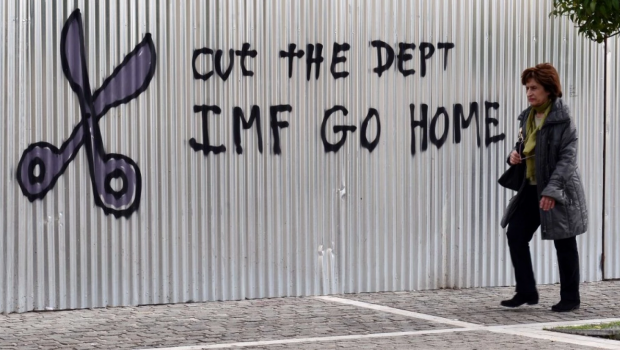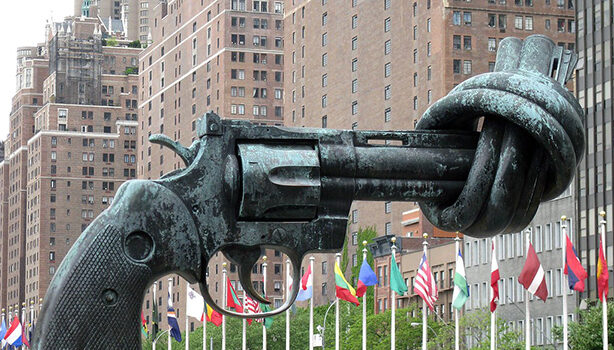Oligarchy, Corruption and The Greek Crisis.
Oligarquía, corrupción y la crisis griega
Paul Mason
The historic electoral victory of Syriza, Greece´s left-wing party , calls into question the rigorous economic austerity policy imposed by the European Union. This triumph, according to a recent study done by The Economist, could mean that a political and economic earthquake can trigger the rise of antiestablishment parties in countries such as Spain, United Kingdom, Sweden, Finland and even Germany, with the subsequent crisis in the EU from its foundation. In the following interview, Paul Mason (collaborator for The Guardian and specialist in the topic) exposes his point of view over something people are already calling the “European spring.”
***
Rose Mary Salum: The IMF predicted Greece would grow as the result of its aid package in 2010. Instead, the economy has shrunk by 25%. People are obliged to live with less than 500 euros a month. What else can be asked from the Greek people? In your opinion, what solution could actually work given the current situation?
Paul Mason: Both sides in politics believe there has to be debt rescheduling. But the conservatives and the centreleft were trying to do a deal that put repayment off into the 2060s, while keeping the whole burden of debt, requiring austerity forever. The IMF and EU asked Greece to run a 4% of GDP budget surplus – which most economists think is impossible.
So the new government is not being that radical when it says the debt is unpayable. Its radicalism lies in its solution, which during the whole EU crisis has been resisted by other states: a debt writeoff and a moratorium on repayment and interest on the rest until the economy grows.
Thats why this is no longer just a Greek issue: the precedent of a write off of public sector debt – to other countries and the ECB – is massive, because the governments have only so far forced private bondholders and savers to take the hit.
Once a deal is done, the key is to get Greece growing – and the microeconomic reforms Syiza wants to do have never been tried in a country so damaged by neoliberal dogma.
Over three general elections Syriza’s achievement has been to politicize the issue of the oligarchy. Can you elaborate on how the Greek oligarchy has been an obstacle for the proper development of the country?
Yes, really clearly. One night I was with a young, technocratic member of Pasok and he said to me: I am supposed to go to a party organised by the elders of Pasok. But I don’t want to go because it will be like the party Michael Corleone throws at Lake Tahoe in Godfather II. That’s how the business school and law graduate young technocrats feel about the way both parties were run for forty years.
The problem is, when they finally got around to forming a centre-left, technocratic party prepared to take on the rich, tax-evading families, Syriza had already captured that agenda.
Over the course of four decades, the two parties carved up the Greek state. Every new minister brings politically appointed civil servants – so there’s no continuity. A landfill site that was supposed to be in location A, gets moved to location B. Plus – and this is shocking – there is complete acceptance of the political control of policing. So when I was in a theatre being beseiged by fascists, lobbing stones into a courtyard because the actors put on a gay play, the manager phoned – and got through to – the Minister of the Interior, not the chief of police.
As a result of oligarchy, a Greek motorway costs three times more to build than a French motorway. And the key industry – shipping – is effectively tax exempt. The state becomes a negotiating chamber between corporate interests, and never stands above them.
So the kind of reforms and capacity building needed are actually the ones you would use in a recently democratised Latin American dictatorship!
The youth is tired of corruption and tax evasion. How are they responding, and what are their proposals? In other words, how have the younger generations changed the political landscape?
The youth swarmed into Syriza. And to an extent into To Potami. But there are also many anarchist-inspired youth who even now didn’t vote, and simply live a marginal and bohemian life. The commonly quoted uncome for graduates with three low skilled jobs is 400 Euros a month. You can rent a large apartment for 350, and six of you sleep in it. That’s how they live.
But its important to note that with a few exceptions, the youth are not powerful in Syriza. Greek society is patriarchal – with a lot of respect for men with grey hair, even in a radical party like Syriza. It’s HQ is a bit like the senior common room of a University. That’s the key to understanding why so few women got into the cabinet. It is a party that still operates with implicit concepts of seniority and competence.
You’ve reported the Greek crisis since it began. In your opinion, how does this problem affect the global market?
As a default, any Greek default would not destroy the global market. More imporant is its symbolism. This is as big – probably bigger – than the victory of Evo Morales in Bolivia, or the Sandinista Revolution: it’s the first time in modern history that a far left party, from outside the Moscow tradition, has come to power. So for example its macro policies are Keynesian, and will be heavily constrained by the deal with the IMF/EU. Its micro policies already include a lot of experimentation with peer-to-peer and network economics, like installing mesh networks in mountain villages, and co-op experiments on the land.
Do you think Greece should exit the eurozone? If so, what would be the consequences?
Exiting the Euro would be big: the Greek middle class is psychologically anchored to the Euro as a symbol of democracy and global integration. But after the shock of leaving, and the disruption, Greece would be able to devalue, attract investment and take control of its own policies. It would have to default at the same time, because the debts would be unpayable. But after the way they’ve been treated by a German-dominated EU, a lot of Greeks no longer think leaving would be a disaster.
Cover image: (AFP/Getty Images)
 Rose Mary Salum is the founder and director of Literal, Latin American Voices. She´s the author of Delta de las arenas, cuentos árabes, cuentos judíos among other titles.
Rose Mary Salum is the founder and director of Literal, Latin American Voices. She´s the author of Delta de las arenas, cuentos árabes, cuentos judíos among other titles.
©Literal Publishing
***
El Fondo Monetario Internacional pronosticó el crecimiento de Grecia a raíz de la ayuda que se le otorgó en el 2010. Sin embargo, la economía griega se ha contraído un 25% desde entonces. Sus ciudadanos se han visto obligados a vivir con menos de 500 euros al mes. ¿Qué más se le puede pedir a los griegos? En tu opinión, ¿qué podría funcionar dadas las circunstancias actuales?
Todos los partidos políticos creen que la deuda debe reorganizarse. Los conservadores y la izquierda estaban tratando de llegar a un acuerdo para proponer la suspensión de pago de la deuda pública hasta el 2060, manteniendo la carga del total de la deuda gubernamental bajo el requisito de austeridad permanente. El Fondo Monetario Internacional y Estados Unidos solicitaron que Grecia mantuviera el producto interno bruto en un 4% del superávit del presupuesto— lo cual es imposible según muchos economistas.
El gobierno recién elegido no es radical cuando dice que la deuda es incosteable. Su radicalismo recae en su propia solución, la cual fue rechazada por los países miembros durante la crisis de la Unión Europea: otorgar una deducción de la deuda y, asimismo, conceder una moratoria en los créditos gubernamentales cobrando intereses sobre los adeudos restantes mientras la economía crece.
Por consiguiente el problema no es sólo de Grecia —existe el precedente de una reducción masiva en la deuda dentro del sector público, en otros países y dentro del Banco Central Europeo— porque, hasta el momento, el gobierno ha forzado a los cuentahabientes y propietarios de bonos a pagar las consecuencias.
Una vez que se llegue a un acuerdo, la clave es lograr el crecimiento de Grecia pese a que las reformas microeconómicas griegas que requiere Syriza nunca han sido probadas en un país tan dañado por el dogma neoliberal.
El logro de Syriza después de tres elecciones generales ha sido el de politizar el problema de la oligarquía ¿Podrías explicar cómo, según tu opinión, ésta ha constituido un obstáculo para el correcto desarrollo del país?
Sí, muy claramente. Una noche me encontraba con un joven tecnócrata miembro de Pasok que me dijo: se supone que debo de ir a una fiesta organizada por los miembros más grandes del partido pero no quiero ir porque será como las fiestas que organiza Michael Corleone en el lago Tahoe en El padrino II. Así es como la escuela de negocios y los tecnócratas graduados de leyes se sienten respecto de la forma en que ambos partidos se han manejado durante los últimos 40 años.
El problema es que cuando finalmente lograron formar un partido tecnócrata de centro-izquierda preparado para desafiar a las familias de clase alta evasoras de impuestos, Syriza ya se les había adelantado e hizo suya dicha propuesta.
Durante 40 años los dos partidos han dividido al Estado griego. Cada primer ministro trae consigo a su propia gente y, en consecuencia, se pierde toda continuidad. Asimismo —y esto es desalentador —, existe una completa aceptación del control político de la policía. (Por ejemplo, cuando en un teatro asediado por fascistas éstos agredieron a los actores que escenificaban una obra de temática homosexual, el gerente recurrió al Ministro del Interior y no al jefe de la policía).
La corrupición es otra de las consecuencias de esta situación. Una autopista griega cuesta tres veces más que una francesa… La industria clave del embarque se ha mantenido excenta de impuestos… La verdad es que el Estado se ha convertido en una cámara de negociación entre los intereses corporativos y nunca se ha reivindicado por encima de ellos.
La juventud está cansada de esta corrupción. ¿Pero cómo dicha juventud inside en la política griega?
La juventud es desbordante dentro de Syriza y, hasta cierto punto, en un tercer partido: To Potami. Pero también hay jóvenes con tendencias anarquistas que, incluso ahora, no votaron y mantienen una vida bohemia y marginal. El ingreso común para un graduado que tiene tres trabajos que no requieren de muchas habilidades es de 400 euros mensuales. Puedes meter seis de ellos en un apartamento grande por una renta de 350 euros. Así es como están viviendo.
Así las cosas, es importante resaltar que a excepción de unos cuantos miembros jóvenes, la juventud no tiene poder en Syriza. La sociedad griega es patriarcal y con mucho respeto por las canas, incluso en partidos radicales como el de Syriza. Esa es la clave para entender también por qué tan pocas mujeres se van a la política. Es un partido que todavía opera con conceptos implícitos de antigüedad y competencia.
Has estado al tanto de la crisis griega desde sus inicios. En tu opinión, ¿cómo afecta este problema al mercado global?
El incumplimiento de Grecia no destruiría el mercado global automáticamente aunque, me parece, es más importante lo que esto simboliza. Es relevante —quizá más relevante— que la victoria de Evo Morales en Bolivia o la Revolución Sandinista: es la primera vez en la historia moderna que un partido de extrema izquierda, fuera de la tradición de Moscú, ha subido al poder. Su microeconomía es de la escuela kenesiana y, por lo mismo, se verá fuertemente constreñida por el trato del Fondo Monetario Internacional Europeo. Sus micro políticas contemplan una amplia experimentación con las redes entre pares y una economía solidaria así como el establecimiento de vínculos entre los pueblos de la montaña y de éstos con los experimentos de las cooperativas en el campo.
¿Crees que Grecia deba salir del euro? De ser así ¿cuáles serían las consecuencias?
Salirse del euro sería demasiado: la clase media está psicológicamente anclada al euro como símbolo de democracia e integración global. Pero ante el horror y la desorganización de una posible salida, Grecia debería tener la capacidad de devaluar, atraer inversión y tomar control de sus propias políticas. Al mismo tiempo, tendría que declararse en incumplimiento porque resulta imposible pagar la deuda. Aunque por la forma en que han sido tratados por una Europa dominada por Alemania, muchos griegos han dejado de ver la salida como un desastre.
 Rose Mary Salum es la fundadora y directora de Literal, Latin American Voices. Es la autora de El agua que mece el silencio (Vaso Roto 2015) y Delta de las arenas, cuentos árabes, cuentos judíos (Literal Publishing 2013) entre otros títulos.. Su twitter @rosemarysalum
Rose Mary Salum es la fundadora y directora de Literal, Latin American Voices. Es la autora de El agua que mece el silencio (Vaso Roto 2015) y Delta de las arenas, cuentos árabes, cuentos judíos (Literal Publishing 2013) entre otros títulos.. Su twitter @rosemarysalum
©Literal Publishing. Queda prohibida la reproducción total o parcial de esta publicación. Toda forma de utilización no autorizada será perseguida con lo establecido en la ley federal del derecho de autor.










